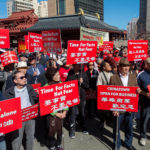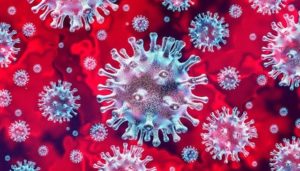Coronavirus and Racism

 This is the transcript of a talk originally given on April 4, 2020 as part of an online meeting titled “Coronavirus, Crisis and Class Struggle,” co-sponsored by New Politics.
This is the transcript of a talk originally given on April 4, 2020 as part of an online meeting titled “Coronavirus, Crisis and Class Struggle,” co-sponsored by New Politics.
The history of racism in this country is as long as it is outrageous—it is, after all, a country founded upon land stolen from indigenous people and built with the enslaved labor of African people. Racism is embroidered into the very fabric of this country. To use a healthcare analogy, it is not a diseased limb one can simply cut off and be done with. Removing racism from our society will take deep and deliberate work.
It should not surprise us that any crisis which befalls this society will particularly affect those who are already marginalized and mainly forgotten. We see this in how Hurricane Katrina was particularly devastating to the poor and Black areas of New Orleans, and we are seeing it again with this pandemic.
African-Americans are already disproportionately represented when it comes to chronic diseases such as asthma, high blood pressure, and diabetes. There is not a gene which predisposes those with greater amounts melanin to have higher rates of these conditions. We live in a racist society where one’s health is directly impacted by the neighborhood one lives in, the kind of jobs they have, the quality of the house they live in, their access to healthy foods, primary care doctors, and their access to adequate medication. This is to say nothing about the high amount of daily stress people of color must endure to survive in this deeply racist society.
Chicago is one of the most unequal cites when it comes to the death gap, one measure of inequality as a function of average life expectancy. Differences are starkly seen when race and class are factors. In Englewood, a poor and African American neighborhood in Chicago, the average life experience is 60. In rich and white Streeterville, it is 90. Only 8 miles apart and there is a 30-year difference.
There’s already damning data coming in about how COVID-19 is disproportionately affecting African Americans. Bio-tech data firm Rubix Life Sciences reviewed billing data and African Americans with the standard symptoms of COVID-19 are less likely than others to receive testing—despite having the exact same symptoms.
In Nashville, they set up three drive through testing centers in diverse neighborhoods, but they never started testing because they didn’t have the tests or protective equipment. In Memphis most screening is occurring in white and well-off suburbs, not in majority Black and lower-income neighborhoods.
In Milwaukee, African Americans only make up 26% of the population, but already represent half of all the cases and 80% of the deaths.
It is this same racism that dismissed in many politician’s mind the seriousness of this—“it’s just Chinese people dying in China,“ they thought, and they don’t care about those deaths. Racism also informed their response—close the border with China (which just caused US passport holders to rush back home) and Trump calling it a “Chinese Virus.”
It’s completely ridiculous to racialize a virus—its literally RNA encased in protein—but it happens all the time.
I’m part of a Facebook group of 12,000 nurses where I made a similar point and the Trump trolls got very excited—“what, I can’t say Chinese food anymore? Is that racist?” In one of my responses, I asked how they would view it if every time a mass shooting took place, the media referred to the “white male shooter?” Someone responded, “but that would only be allowed if they all fit that description.” I didn’t respond with statistics, because the point was: why are negative things such as viruses, killer bees, plagues, so often associated with some race?
There is continuing ongoing blame of China for COVID-19: China covered it up, they are under reporting deaths, they were sent PPE by the US and now this country is in short supply, they are withholding PPE, the list goes on.
No one has to be a fan of the Chinese government to understand there is a difference between a government and the people who live there. We shouldn’t conflate the two and hold people who live under a government accountable for every action of that government. By that same logic, anyone with a US passport should never travel outside of the country, due to the decades of crimes the US government has committed worldwide.
As horrible as the racism on both ends of this equation is, it is not unexpected—but it is disgusting, and it must shape our response.
Racism and xenophobia are consistently reached for by those who run this country—for those who remember, the 9/11 attacks were immediately exploited to stoke racism against Muslims and Arabs.
The ugly part of racism, what makes it useful, is that it is a simple answer, it provides an easy scapegoat—replacing reason with fear, solidarity with division. The Chinese Virus, the Muslim terrorist, it rolls off the tongue so easily. We must aggressively counter this narrative in every arena. We must redirect people’s fears towards the actual cause of this crisis domestically—privatized healthcare. Making profit from managing health is the root of the problem, and that practice must end.
As the incidences and death rate from COVID-19 climbs, we should expect a rise in racism.
There has been a spike in racist attacks on anyone appearing Asian—a family of three in Texas, two of them young children, was recently attacked by someone using a knife. They all, thankfully, survived—but they will be physically and mentally scarred for life.
The attacker, who admits that he did it because “they were Chinese and appeared to be infecting others with COVID-19,” may get charged with a hate crime—but that’s not the solution we need. The purveyors of these ideas will go unpunished.
Andrew Yang, former Democratic Party presidential candidate, wrote an opinion piece for the Washington Post. He stated that “Asian Americans need to embrace and show our American-ness in ways we never had before. We should show without a shadow of a doubt that we are Americans.” Tell that to Donald Trump; tell that to FDR who imprisoned 120,000 Japanese people during World War 2; tell that to the politicians and so-called labor leaders who wrote and supported the Chinese Exclusion act, which banned Chinese people from coming to the US for eight decades.
Andrew Yang is also leading us down a dead-end path—you don’t fight racism by wearing a big American flag t-shirt everywhere.
We must recognize and fight the racism on both ends of this equation—we cannot separate it from what is happening.
We have to raise this as an issue wherever we are active. I am fortunate to be part of a union which takes fighting racism seriously, and the Chicago Teachers Union published a short piece I wrote on the intersection of racism and COVID-19.
I have a nurse co-worker who posted a meme on social media which shows various heads of state and their accomplishments, with the final picture being of China’s Xi Jinping and the caption stating, “I have destroyed your economy.” I messaged her, and she took it down and wrote back that she didn’t consider the “ingrained ignorance of most people in this country.” I’m sure a big part of her sympathy to my response was due to being an African-American woman herself, and knowing exactly what racism looks and feels like. We can have productive conversations within our communities.
We must highlight the disproportionate effect that COVID-19 is having upon the poor, upon people of color, upon the undocumented. We must disrupt the scapegoating of Chinese people. This crisis is exposing all the problems of capitalism—especially racism. In our fights for personal protective equipment, unemployment benefits, healthcare for all, safe work environments, rent relief, etc., we should link these issues together with the systems which produced it.
The silver lining of the pandemic is that many doors have been cracked open for many people, and as socialists we should continue to kick them down.